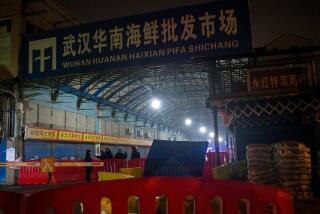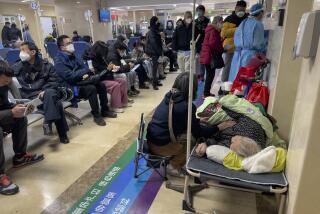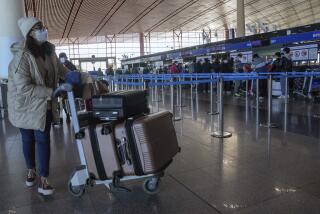South China Is Nonchalant About Illness
- Share via
GUANGZHOU, China — Anyone in Hong Kong tired of the disease phobia that has turned the territory into a landscape of surgical masks only has to cross the border into southern China.
Here in the capital of neighboring Guangdong province, it’s business as usual. Not a single person on the street is wearing a face covering.
Yet this is ground zero of a rare respiratory disease that has jumped to 20 countries around the world, killing 116 people and sickening about 3,000. The bulk of the casualties outside mainland China have been in Hong Kong, where 32 people have died and an additional 1,059 patients are pushing the island’s hospital system to the brink of collapse. Sixty-one people fell ill in Hong Kong on Friday alone, as officials braced for the possibility that the number of infected individuals could swell to as many as 3,000 by the end of the month.
Talk to people in Guangzhou, though, and they’ll tell you there’s nothing to be afraid of anymore. At least that’s what the Chinese government has been telling them.
“So what if we believe it? So what if we don’t?” said a shopkeeper surnamed Luo in an apartment complex in the shadow of a large military hospital. “All I can do is try to take better care of myself, wash my hands more often.”
Beijing has come under sharp criticism from the international community for failing to inform the public about the deadly virus before it could spread to the rest of the world. The government has only recently permitted state media to report on the disease, but mostly to declare victory rather than sound alarms.
China’s official infection rate is 1,290 sick and 55 dead. But in a rare move Friday, a senior Chinese doctor contradicted official claims that only 22 people had been stricken in the capital and only four had died. Jiang Yanyong said he and colleagues at Beijing’s military hospitals have treated at least 60 patients.
Independent reports of new cases have added to concern that authorities are downplaying the gravity of the situation to safeguard social stability. The Beijing office of the Japanese company NTT Data shut down its offices this week for disinfection after one employee came down with the virus. Co-workers said Friday that the woman probably caught it because she had been visiting her mother at a Beijing military hospital where SARS patients had been housed. She in turn infected her father and husband.
Pressure on the central government is mounting because two foreigners died in China this week from what has been dubbed severe acute respiratory syndrome, or SARS, and other people with SARS-like symptoms are hospitalized in Shanghai. Until now, China’s image-conscious financial capital has been reassuring the public that it has had only one confirmed case of SARS and that the city is safe.
As the infection rate continues to climb across China, one Guangdong health official admitted Friday that it is inaccurate to describe SARS as “under control.” That has been the party line since Beijing admitted that the disease broke out in Guangdong in November.
In Guangzhou, however, no amount of propaganda has been able to erase the trauma felt by front-line hospital employees, who have been hit the hardest by the virulent bug.
“I was scared to death. I burst into tears when I saw my temperature go up,” Tao Zhili, a 20-year-old nurse recovering from SARS in a military hospital said by telephone.
She had reason to be petrified. Her best friend, another nurse in their crowded dormitory, already had been hospitalized with the disease. Tao took her own temperature every morning, knowing fever is a key sign of SARS. When she fell ill late last month, she resisted telling her roommates. Her hometown is far away, and she didn’t want to be kicked out.
But instead of getting better, she got sicker. Doctors X-rayed her lungs and immediately put her in an isolation ward. She and other SARS patients lived three to a room. At one time, all the beds in the ward were filled.
“We have to wear our masks all the time, even when we sleep,” Tao said.
“When my mother and grandmother heard, they cried and cried. My father screamed. He demanded that I go home.”
But she didn’t. Nursing jobs are hard to come by. Luckily, she is now well enough that she has been told she can leave the hospital next week. But her boss gave her a two-week break, to rest.
Outside her window is Nanfang Hospital’s sprawling campus, a self-contained world with its own post office, bank, travel agency and restaurants. It has taken care of about 10% of Guangdong’s SARS cases, according to state media, and most of them have recovered.
Sure enough, people in the complex appeared Friday to be carrying on with their lives as if the outbreak were a world away.
No one wore masks. Not the soldiers in uniform entering and emerging from the large hospital lobby. Not the crowd squeezing into a packed elevator. Not the pharmacists selling traditional and Western medicines, nor the patients strolling in pajamas.
Altogether, the scene presented a glaring contrast to Hong Kong and Singapore, which responded to the epidemic by closing schools, quarantining hundreds of people and splashing health warnings in public.
As governments around the world respond to an unusual World Health Organization travel warning by discouraging their citizens from visiting affected countries or by rejecting tourists from southern China, the mainland remains an anomaly. Despite the fact that tourism in the region has come to a virtual standstill, China remains open for business.
Guangdong officials say they will continue with plans to hold their annual trade fair next week. It’s part of an effort to create the appearance that everything is OK.
Said shopkeeper Luo: “If they canceled the trade fair, people would really think something is wrong.”
More to Read
Sign up for Essential California
The most important California stories and recommendations in your inbox every morning.
You may occasionally receive promotional content from the Los Angeles Times.













